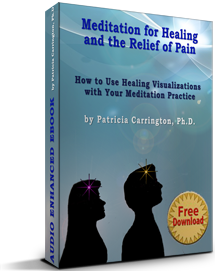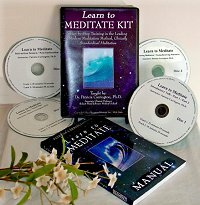Dr. Patricia Carrington's award winning meditation technique CSM (Clinically Standardized Meditation) is a clinically sensitive meditation method developed by the Medical Department of New York Telephone Company and used by numerous medical institutions, organizations, and individuals worldwide. For information click here.
Meditation and Personal Growth
Experiencing Oneself as “Just Being”
Patricia Carrington, Ph.D.
Author of “The Book of Meditation”
Because meditation gives us time off from our normal activities to discover depths within ourselves which are not usually accessible, in meditation we come to know, in a profound sense, who we really are, and this awareness may affect our lives outside of meditation in an important manner. As one meditator wrote:
As I sit here quietly in my meditation, I am suddenly aware that I exist . . . I am a being unto myself . . . I am separate from lover, friend, mother, father, therapist, whomever . . . but in my meditation I do not sense this aloneness as loneliness, I know it as closeness to myself and to life.
Meditation is a complete experience in and of itself. When in this state the outer world may threaten us, sights and sounds may pound at us for attention, but we recognize that none of this fundamentally changes who we are. Through it all, the quiet intake and outflow of breath goes on, the gentle rhythms of our pulse coordinate with the soundless beat of our mantra or with the motion of our breathing, and we know that whatever else may or may not happen, life goes on, and that this life extends beyond our individual life, it is fundamental, and – it is part of us.
This sense of sureness about our own existence tends to linger with us after meditation and it changes things. Matters which formerly distressed us often shrink to relative unimportance alongside this immediate experience of livingness. This new sense of self may lay the base for a new awareness of our inner resources and the rights of all human beings including ourselves – attitudes which, as we have seen, are often reported by meditators.
During meditation we also learn not to force our minds or bodies to do what we want them to do or what we believe they should do, but rather to follow gently where they lead. This experience of trusting the wisdom of our own inner selves makes meditation an unusual experience for most of us in today’s world. Our society encourages us to manage ourselves as though we were objects, to force ourselves to do things (or not to do them). This attitude is the byproduct of a culture that measures work efficiency in terms of speed of production – the more we force, the greater the profits, or so the thinking goes. Many of our personal problems may, in fact, be the products of our excessively time-oriented culture. In an agricultural society people learn to have infinite patience with the slow and compelling rhythms of nature and so may develop a somewhat different attitude – a greater appreciation for the value of waiting and watching, of flowing with the stream of life rather than fighting it. Meditation may lead us to such a receptive attitude as well, for we cannot meditate if we try to meditate, only if we permit meditation to occur.

